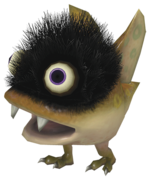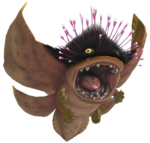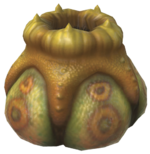Aerodentia family
The aerodentia family is a family of cave-dwelling, light-sensitive creatures introduced in Pikmin 3, although the family went unclassified until Pikmin 3 Deluxe. Its only member is a species known as the Phosbat, and its several stages of life. Members belong to the Tectupervus genus.
Members
Phosbat
- Main article: Phosbat.
The Phosbat is the infant form of the Vehemoth Phosbat. It bears some notable resemblances to the adult form, including its orange wings, black, hairy head, and big bulging eyes that squint when exposed to light. The noises the Phosbat emits are also similar to that of the adult form. Its legs are stumpy, similar to those of the adult, but it lacks proper arms. It also lacks fluorescent lights upon its head, and only two fangs are visible in its mouth.
Vehemoth Phosbat
- Main article: Vehemoth Phosbat.
The Vehemoth Phosbat is a boss in Pikmin 3, and is the second boss encountered in story mode. It is a large, bioluminescent moth-like creature with massive orange wings, yellow eyes, small stumpy limbs, and a large gaping whale-like mouth.
Phosbat Pod
- Main article: Phosbat Pod.
Phosbat Pods are nest-like structures from which Phosbats spawn. If light from a Glowcap shines on top of one, it closes its opening, preventing it from spawning more Phosbats; it will also stop spawning Phosbats after it has spawned five of them. If a Phosbat Pod doesn't activate before the big light bulb in the Vehemoth Phosbat arena is turned on, it will remain small. It should be noted that attacking a Phosbat Pod will attract the attention of the Vehemoth Phosbat.
Naming
|
This article is a stub. You can help Pikipedia by expanding it. |


